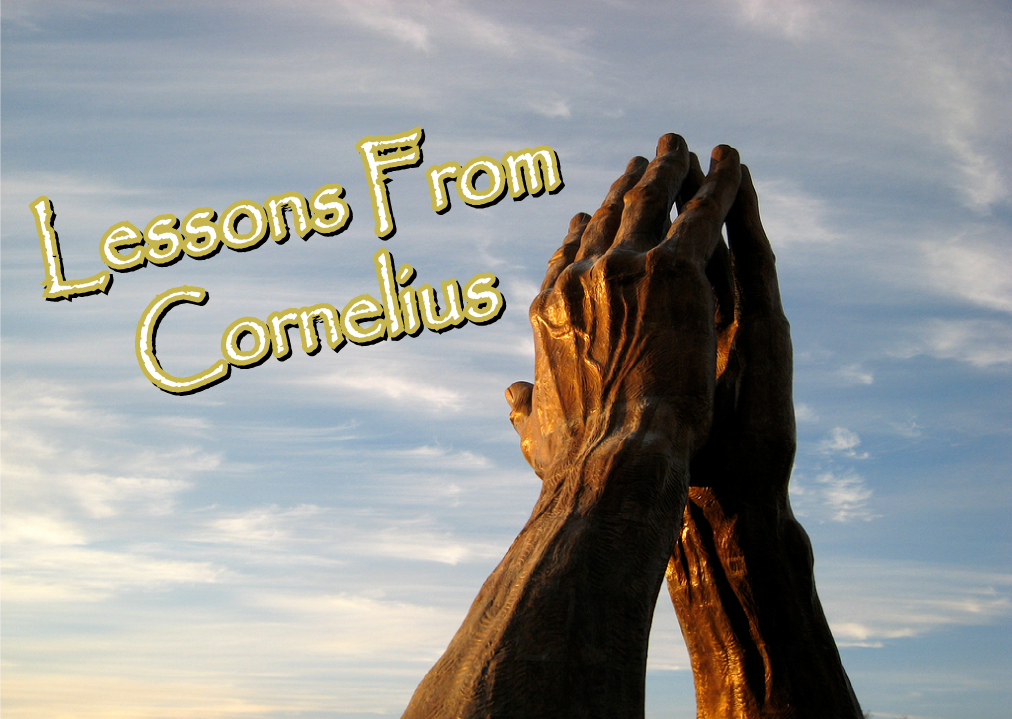In Acts chapter 10, many lessons are taught to us about the utility of the gospel, both what it does and does not do. Cornelius the central character in this chapter was a Gentile, that is, he was not of the nation of the Jews. The Jews at that time had no dealings with the Gentiles and thought them to be unclean like dogs. It was generally thought by the Jews that the children of Israel were God's chosen race and that only they had a right to be called children of God. Even the Jewish church of that day had not reached out to the Gentiles, thinking that the gospel was intended for the Jews only.
Today, we are living in a world where the vast majority of those who profess to be Christians believe that the individual is a least partially responsible for his being saved from sin and being born of the Spirit of God. Most believe that the gospel is an instrument to bring an offer of salvation to the individual and how that individual responds to the gospel will determine if he/she spends eternity in heaven or hell.
Before we examine the lessons learned from studying Cornelius and his response to the gospel, let us look at the attributes of someone who has not yet been born of the Spirit of God. Romans chapter 3 gives us a set of attributes of those who are under the law of sin and death and thus not yet born of the Spirit of God: Rom. 3:9-18 "What then? are we better than they? No, in no wise: for we have before proved both Jews and Gentiles, that they are all under sin; As it is written, There is none righteous, no, not one: There is none that understandeth, there is none that seeketh after God. They are all gone out of the way, they are together become unprofitable; there is none that doeth good, no, not one. Their throat is an open sepulchre; with their tongues they have used deceit; the poison of asps is under their lips: Whose mouth is full of cursing and bitterness: Their feet are swift to shed blood: Destruction and misery are in their ways: And the way of peace have they not known: There is no fear of God before their eyes."
From the above passage we conclude that some of the attributes of an individual before he is born of the Spirit include the following:
1. He is unrighteous.
2. He does not understand the things of the Spirit of God (1 Cor. 2:14).
3. He does not seek after God.
4. He does not do good.
5. He does not fear God.
Thus, if a man is righteous, or if he understands the things of the Spirit of God, or if he seeks after God, or if he does good, or if he fears God, then he has been born of the Spirit of God.
Moreover the formerly blind man whose eyes the Lord had opened gave this testimony in John chapter 9: John 9:31 "Now we know that God heareth not sinners: but if any man be a worshipper of God, and doeth his will, him he heareth." Thus, we conclude that God does not hear the prayers of those sinners that have not been born of the Spirit while he does hear the prayers of those who are worshippers of God and that doeth the will of God.
Now let us consider Cornelius and his condition prior to hearing the gospel. Prior to Peter ever coming to preach the gospel to Cornelius and his household we read the following statements about Cornelius that indicate to us whether he was born of the Spirit of God before the gospel was preached to him or was not born of the Spirit of God prior to the gospel being preached to him:
1. In Acts 10:2 Cornelius is described as a devout man. The Greek word translated devout in this passage is "eusebes." This word is found in the New Testament four times and three of those times it is translated devout and one time it is translated godly. The literal meaning of the word is godly. Thus, Cornelius is described by the Holy Spirit as a devout or godly man. No where in the scriptures is a person who has not been born of the Spirit described as being godly. The unregenerate are always described as being ungodly.
2. Also, in Acts 10:2 we are informed that Cornelius feared God. This is in contrast to the description of the unregenerate in Rom. 3:18 as having no fear of God before their eyes. Since the unregenerate do not fear God and Cornelius feared God, then Cornelius must have been regenerated or born again before he heard the gospel. Likewise, Cornelius' entire household feared God. This teaches us that they also must have been born again before the gospel ever reached their ears!
3. Cornelius we are informed in Acts 10:2 went about doing good as he gave much alms to the people. Later we read that his alms came up for a memorial before God. No doubt, God was very pleased with the good that Cornelius was doing in helping the needy people. Again, this is in contrast to what we read about the unregenerate in Rom. 3:12: "there is none that doeth good, no, not one." Since, the unregenerate do no good and Cornelius was doing much good, we must conclude that Cornelius was born of the Spirit prior to hearing the gospel.
4. Cornelius was a praying man according to Acts 10:2: "prayed to God alway." The word, "alway," means continuously. Thus, Cornelius was continuously praying to God. The question is "Did God hear his prayers?" If God heard his prayers then according to John chapter 9 Cornelius was a worshipper of God and one who did the will of God. The question is answered for us in verse 4: "Thy prayers and thine alms are come up for a memorial before God." Thus, both the prayers of Cornelius and the alms of Cornelius were accepted of God and even came up for a memorial before God. As was stated in John chapter 9 God does not hear the prayers of sinners (unregenerate). The only conclusion we can draw is that Cornelius was already born of the Spirit.
5. After that Cornelius obeyed God and sent three men to seek for Simon Peter and Peter had gone upon the housetop to pray and fell into a trance, God showed Peter that God had a people among the Gentiles that He had already cleansed: "What God hath cleansed, that call not thou common." The Gentiles had not had the gospel preached unto them at this time. Yet God said that he had already cleansed them. They were clean through the shed blood of Jesus Christ. Christ had died for them and his blood was effectual in cleansing them from their sins. This truth was illustrated to Peter when he went to visit with Cornelius and his household. Peter did not go to cleanse them or give them an opportunity to be cleansed, they were already cleansed.
6. Cornelius had a good report from those who knew him and the three men he sent to seek Simon Peter gave this report of him that he was "a just man, and one that feareth God, and of good report among all the nation of the Jews." Only God's elect are just. Cornelius was more than legally just, having been justified on the cross through the shed blood of Christ. He was also effectually just, having been born of the Spirit of God, and it was recognized by those who knew him.
7. After Peter went to Cornelius house and met Cornelius and his household, but before he preached the gospel unto them, he made this observation: "Then Peter opened his mouth, and said, Of a truth I perceive that God is no respecter of persons: But in every nation he that feareth him, and worketh righteousness, is accepted with him." Peter not only acknowledged that God does not respect the Jew over the Gentile, but he also stated that those who fear him and work righteousness are already accepted with God. Thus, Peter acknowledged that Cornelius and his household were already born of the Spirit of God and accepted with God before Peter preached to them.
Based on the seven undeniable proofs above, we are forced to the conclusion that the gospel cannot be the means by which one is born of the Spirit or saved from their sins. What then is the purpose of the gospel? This testimony about Cornelius in Acts chapters 10 and 11 tells us several things in which the gospel benefits God's born again people:
1. The gospel tells us about Jesus, both who he is and what he has done for us: Peter preached to Cornelius and his household and friends the following "How God anointed Jesus of Nazareth with the Holy Ghost and with power: who went about doing good, and healing all that were oppressed of the devil; for God was with him. And we are witnesses of all things which he did both in the land of the Jews, and in Jerusalem; whom they slew and hanged on a tree: Him God raised up the third day, and showed him openly." Thus, Peter preached the life, and the death, burial, and resurrection of Jesus Christ. Peter also preached of the things that Jesus did. Among the things that Jesus did are that he saved his people from their sins, established and built his church, and gave his people a kingdom here on earth.
2. The gospel instructs the Lords people on the things that they ought to do: Acts 10:5, 6 "And now send men to Joppa, and call for one Simon, whose surname is Peter: He lodgeth with one Simon a tanner, whose house is by the sea side: he shall tell thee what thou oughtest to do." The gospel tells us what we ought to do as children of God. It tells about our duty to repent, to press into the Lord's Kingdom church through water baptism, to live lives separate from the world. It also tells us how we ought to behave ourselves and saves ourselves in an untoward world. It tells us how we are to behave ourselves as husbands, wives, children, servants, masters, etc. It tells us how we ought to worship and how we ought to conduct ourselves in the Lord's church.
3. While the gospel does not save us from our sins, or cause us to be born again, or give us a home in glory, yet it does save us here in time from an untoward generation and to a knowledge of the truth and to worship and serve God in Spirit and in truth in His church: Acts 11:12-14 "And the Spirit bade me go with them, nothing doubting. Moreover these six brethren accompanied me, and we entered into the man's house: And he showed us how he had seen an angel in his house, which stood and said unto him, Send men to Joppa, and call for Simon, whose surname is Peter; Who shall tell thee words, whereby thou and all thy house shall be saved."
4. Through the preaching of the gospel and belief of the gospel message we are informed that our sins have been remitted: Acts 10:43 "To him give all the prophets witness, that through his name whosoever believeth in him shall receive remission of sins."
Elder Vernon Johnson
|
|


